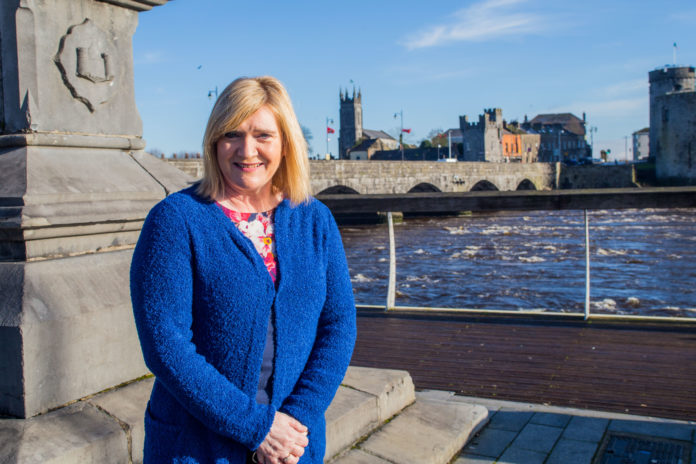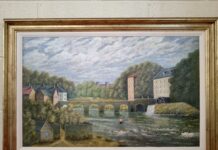
STEEPED in journalistic DNA, Cathy Halloran was listening to the radio news with her father at a young age, but it’s her love of storytelling that underlines much of her career in media.
It’s somewhat incongruous to consider that this Dublin city native started her career writing features for a farming magazine.
“I didn’t get the law course I wanted in college so I repeated my leaving certificate and got a much better result. At that stage I started working in a farming magazine writing features.
“What did I know about farming? Very little but, boy, did I learn fast.
“I just got the wellies on and got out there and to this day I still love doing stories on farmers.
“My father was a journalist, my uncle was, my brother is and my first cousin is, but it was my father that got me in to it.
“He worked in the Western People in Balina so I grew up with news as he went on to work in the Irish Independent and then went on to RTÉ in the early 60s when the station was just founded.
Cathy describes him as an “inspirationally wonderful newsman”, so it is no surprise that she would have a keen interest in media.
“It was there from day one, we couldn’t open our mouths during the 1.30 news, or at 6 or at 9. There was silence”.
The storytelling tradition of her grandparents and ancestors in the Céide Fields of Mayo, coupled with her “father’s primary influence” kick-started her career.
Four years with the farming magazine was followed by a two-year sting “on the dole”.
“It was a critical stage as I was 21 and I said to myself you are either going for this big time Cathy or you’re not.”
Writing to the editor of every provincial newspaper in the country, “of which there were 35 or 40 at the time,” she received only three replies and no job offers.
She kept applying to RTÉ and the national papers.
Being young and inexperienced proved a major drawback but a four year stint in Galway is a time she remembers fondly.
“I did my time there and loved it, the city, the people and the work and even though my mother died during my time there. I wanted to stay, despite thinking I should go back to Dublin.
“It was a brilliant grounding and by the time I went for interview in RTÉ, I knew I was ready for the job but I didn’t know if I was ready to leave Galway.
A massive jump awaited – “25 nice short feature paragraphs for a newspaper became 25 nice short seconds for a television script so that had to be a quick learning curve.
Thanks to a childhood involvement in drama, standing in front of a microphone was far from daunting and the screen tests proved that.
“One of my first jobs was to write the script on the day Don Tidey was released by his kidnappers and it went on from there.I was on the beef tribunal for three years and, as a bit of a thank you, I was offered to join President Mary Robinson on a State visit of New Zealand, Hong Kong and India.
“I was in Iraq for a week filing reports with Trocaire and the refugees banished to the mountains.
“When I left for home, they were going to take all my video tapes my hard-earned week’s work. There was red tape about my tapes even though they had been passed, armed troops stopped me at the airport and searched me. Women in one queue and men in another.
“I explained I was a television journalist and the tapes had been passed but they wanted to confiscate them so I was getting upset but arguing strongly. All the other women started to advocate on my behalf and told them to leave me alone. I still managed to get some out though. The women beside me were weeping when the plane took off as they left loved ones, but I was delighted to be leaving.”
With decades of news coverage behind her, Cathy has seen and covered possibly every type of story.
“From human tragedy, to stories of extraordinary human achievement – one makes you unbelievably sad and one makes you smile but the worst are those involving violence against children. It is because the enormity of the tragedy must be in your words.”
Learning to deal with how stories remain with you after the camera has stopped rolling is one thing she didn’t do very well in her early years but that improved with experience.
“Limerick is one of the best news centres in the country and there is every type of news story here.
“I was keen to get the region national coverage so I covered everything from fishing rows at Lough Derg to the terrible consequences of gang violence.
“Ya, the gang stuff was tough for me at the time”.
“It was hard going and I had to get security advice, so that’s how bad it was, but it never made me question if I should stay in the job.
“You deal in catastrophic thinking because you have seen the worst. You sometimes fear the worst for yourself and your family and that is one of the consequences of the job.”
“You can’t forget the awful stories like the Newcastle West murders, the Clare murders. You can’t forget Shane Geoghegan or Roy Collins.
“Without diminishing the suffering of any other victims, it was important to try and tell the story about Shane Geoghegan’s violent death and how horrified the city was.”
The enormity of Anthony Foley’s death was probably only surpassed by the death and remembrance of Dolores O’Riordan.
“They were stories that went global, but the telling of a story doesn’t change despite everything around changing, including the way it is delivered.
“It starts with people having the confidence in you to tell their story and it is probably one of the biggest deals in journalism for them to trust your words.
“And that is a huge privilege.
Despite changes in media, there is still a role for quality journalists.
“Now more than ever it is important to question how we are governed and to call people to task.
“If fake news reigns, accountability ends because people in power can do what they like if they are not made accountable by good journalism.
“Just because you put something up on facebook, it doesn’t make you a writer or at least a writer of quality,”
Another touch point is Limerick’s ongoing transformation.
“Finally the message about Limerick is getting out. It’s a good place to live, it’s near the coast, it’s got great sporting facilities and it’s got good family units.
“In the early years, friends asked me what was I doing coming to live in Limerick. Oh my God, was a I nuts they thought. Now I defend it big time, I am proud of it too and this is my home.”
Enjoying Limerick’s simple pleasures is a way to get away from the work, but “shooting the breeze” with her late dad who passed away three years ago is one thing that she sorely misses.
Cathy’s advice for a younger version of herself is simple.
“Don’t worry so much, it all happens anyway.”
“I’m in the autumn of my career now so ,as to the future, who knows what will happen in my 60s, but a little house on the coast was always a dream.”
“I will stay in Limerick though, it’s my home”.









